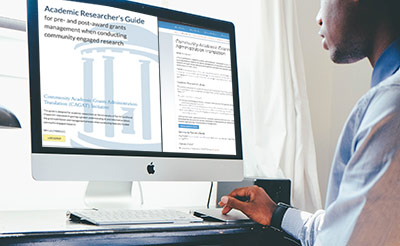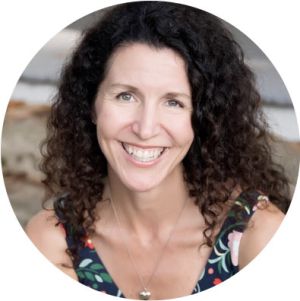
InsideTraCS — with Lori Carter-Edwards
InsideTraCS: Get to know your extended research team through a new series featuring conversations with faculty and staff.
Lori Carter-Edwards, PhD
Lori Carter-Edwards, PhD, is a social epidemiologist, health educator, and nationally recognized expert in community-engaged research. For the last ten years, she has helped lead the NC TraCS Community and Stakeholder Engagement Program (CaSE), first as a faculty lead, then as associate director, and the last two years as director. She has also served as an associate professor in the Public Health Leadership Program, and adjunct faculty in both Epidemiology and Health Behavior at the UNC-Chapel Hill Gillings School of Global Public Health.
On August 30, she left UNC to join the faculty at the Kaiser Permanente Bernard J. Tyson School of Medicine in Pasadena, California.
Marla Broadfoot, NC TraCS science writer, recently spoke with Carter-Edwards about her time at UNC and TraCS, her new position, and her hopes for the future of community-engaged research.
Why is community-engaged research so important?
I think that it directly impacts the science. To do quality science requires you to understand and ask better questions, make better interpretations, and involve the population that you're serving the best way you can. We want to avoid "helicopter research," where we dictate how research will take place in communities without fully involving them in the process, gathering data that we need for a particular study, and then flying away without leaving something meaningful behind.
It takes a long time to build relationships to create great community academic partnerships, but it is important because then you end up addressing the issues that matter to both academic researchers and communities versus a one-off study that leads to no sustainable change.
We've got to do a better job of that across the board. Even those of us who have been doing this work for years have to frequently reevaluate how we are conducting business with our communities, including how we involve new partners and communities to change health and health policy at the individual, group, and community level.
You created the NC TraCS fiscal readiness initiative to improve the capacity of community-engaged research at UNC. Where did this idea come from, and how is it building the infrastructure to help support this kind of research?
In 2012, I was a principal investigator of a project that was investigating a peer support intervention for weight loss in eastern North Carolina. In the university setting, we have multiple layers of checks and balances that the community might not understand. I realized that those administrative hurdles, and that gap in understanding, could create delays that would impact when we would be able to recruit participants as well the timing of when we got data. It struck me that the system wasn't working for anybody.
So I gathered about 20 people in the same room, from four different types of stakeholders—researchers, research administrators, community partners, and representatives—to discuss the issue. After that, I did some engagement activities with community partners to learn what they were looking for in this relationship and what we were looking for in this relationship. There was a clear need to improve both the knowledge and the communication between community and academic partners.
That led to the concept called fiscal readiness. We decided to create two guides for community partners and academic partners, that are now housed on our TraCS website. Since then, we have presented the tools at the national level, and given workshops or learning sessions, as well as in-services at different institutions like Yale and Duke where we work with them directly and tailor our approach to meet their specific needs.
What are in these fiscal readiness guides?

These guides are comprehensive reference guides that are about 90 pages a piece and provide information about what a pre-award process is like. What are the expectations of the university? And what are the expectations of the community partner?
The guides explain the process, provide timelines, and give tips and strategies for how to communicate with partners. They also contain definitions of unfamiliar terms, like an SBA rate or a DUNS number, and provide illustrative examples of various components, like biosketches and invoices. So they contain quite a bit of information.
Last April, you published a paper examining the fiscal and administrative barriers to conducting community-engaged clinical and translational research. What were your main findings?
That qualitative study is now starting to get some national attention, which I am very pleased to see. My counterparts at other CTSAs have told me that they are sharing the paper with their institutional leadership because they realize the necessity to make some changes in how we do business, not just within community and academic partnerships but also at the institutional level. That's why I think this work is so critical, right at this juncture, and UNC is primed to push this even further.
In our study, we interviewed eight community partners, eight academic researchers, and eight research administrators across our four institutions, UNC, Yale, Medical University of South Carolina, and Vanderbilt. We identified several cross-cutting challenges, including communication gaps between stakeholder groups; limits in supporting community partners' fiscal capacity; and lack of collective awareness of each stakeholder group's processes, procedures, and needs.
There are two big areas where we at UNC could move forward. One is bolstering the relationship between the community partner and the researcher that directly is working on the research study. We can improve the researchers' knowledge and the community partners' knowledge of this process and create better spaces for communication. The other is the infrastructure piece, where we can work within the institution to see if we can change certain policies to streamline a process that was never developed for community partners. Most of these processes were for sub-contracting relationships with other academic institutions or large companies. For communities to jump through some of the hoops that may not necessarily apply to their situation makes the entire process more cumbersome.
You moved to California to start a new job at the end of August. What will you be doing?
Kaiser Permanente Bernard J. Tyson School of Medicine
In 2020, Kaiser Permanente started a school of medicine named after Bernard J. Tyson, the past president and CEO of Kaiser, an African American male who worked within the organization for over 30 years before his passing. The school is in its second year, and the mission is to teach medical students differently. The whole structure is built on a framework of equity. The first five cohorts are getting their education paid for to help eliminate some of the barriers for certain groups who would not be able to attend otherwise.
I am the first assistant dean for community engagement. So I'm bringing what I've been doing at UNC and TraCS, as well as in my role in the Public Health Leadership Program in the Gillings School of Global Public Health, to build a platform that links the community further with the Kaiser's medical school and healthcare system.
It is exciting, but I love my job at UNC. So I'm hoping to continue to do this community-engaged research in partnership with my colleagues. It's a space where I truly believe TraCS has a great track record and there's great interest to keep it going, even on a national level.
Now that you have departed TraCS, what legacy do you hope to leave behind?
My girlfriend calls me the community's researcher, and that means a lot, because you make sacrifices to do what you're called to do, whatever that is. My path has never been anybody else's path, but it's a path that I love and that I've been successful at following. I'm grateful to all the partners that have helped me be successful, whether it's my community partners or my academic partners.
To have your friends call you the community's researcher is an implication of trust, and right now, trust is so huge. Building these relationships matter, so if that's my legacy, that's great.
NC TraCS is the integrated hub of the NIH Clinical and Translational Science Awards (CTSA) Program at the University of North Carolina at Chapel Hill that combines the research strengths, resources and opportunities of the UNC-Chapel Hill campus, partner institutions RTI International in the Research Triangle Park, North Carolina Agricultural and Technical State University in Greensboro, and North Carolina State University in Raleigh.


